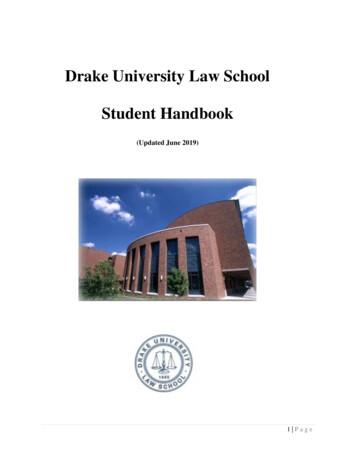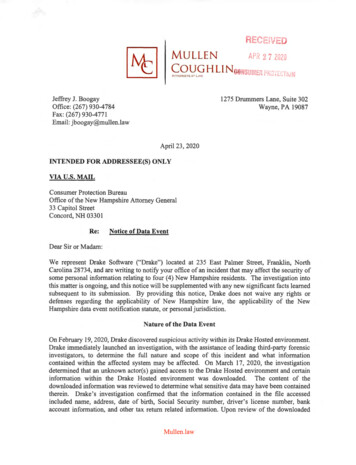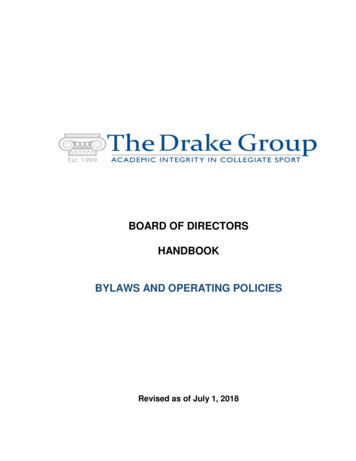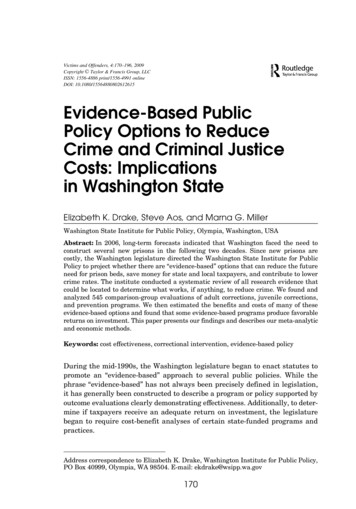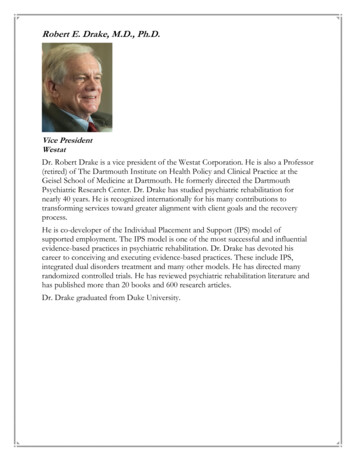
Transcription
Robert E. Drake, M.D., Ph.D.Vice PresidentWestatDr. Robert Drake is a vice president of the Westat Corporation. He is also a Professor(retired) of The Dartmouth Institute on Health Policy and Clinical Practice at theGeisel School of Medicine at Dartmouth. He formerly directed the DartmouthPsychiatric Research Center. Dr. Drake has studied psychiatric rehabilitation fornearly 40 years. He is recognized internationally for his many contributions totransforming services toward greater alignment with client goals and the recoveryprocess.He is co-developer of the Individual Placement and Support (IPS) model ofsupported employment. The IPS model is one of the most successful and influentialevidence-based practices in psychiatric rehabilitation. Dr. Drake has devoted hiscareer to conceiving and executing evidence-based practices. These include IPS,integrated dual disorders treatment and many other models. He has directed manyrandomized controlled trials. He has reviewed psychiatric rehabilitation literature andhas published more than 20 books and 600 research articles.Dr. Drake graduated from Duke University.
Gary Bond, Ph.D.Senior Study DirectorWestatDr. Gary Bond, Senior Study Director at Westat, is a mental health servicesresearcher. His career includes over three decades as professor of psychology andpsychiatry at three universities. His research centers on the dynamics of evidencebased services for adults with serious mental illness. The Individual Placement andSupport (IPS) model of supported employment is one of these services. Dr. Bondalso investigates factors influencing the success of evidence-based practices. Healso pioneered and studies the development and validation of fidelity scales tomeasure implementation.His work includes numerous IPS studies. These include randomized controlledtrials, evaluations of conversions of day treatment services to IPS, andimplementation studies. He has served as principal investigator or co-investigatoron more than 80 grants and contracts. Dr. Bond’s publications include 300 papersin peer-reviewed journals and 17 books and manuals. His reviews of the IPSliterature are among the most widely-cited papers on supported employment.
Tami D. Benton, M.D., FAACAP, FAAPPsychiatrist-in-ChiefChildren’s Hospital of PhiladelphiaAssociate Professor in PsychiatryPerelman School of Medicine at the University of PennsylvaniaTami Benton is the Frederick H. Allen Professor of Psychiatry at the Perelman Schoolof Medicine at the University of Pennsylvania in Philadelphia. She is the Psychiatristin-Chief and Chair of Psychiatry at the Children’s Hospital of Philadelphia (CHOP);Executive Director of the Department of Child and Adolescent Psychiatry andBehavioral Sciences; and Chief of the Division of Child Psychiatry at the University ofPennsylvania. Also, she is a member of the National Institute of Mental HealthAdvisory Council and Director for the Lifespan Brain Institute. Dr. Benton currentlyserves as the director of the Child and Adolescent Mood Program and the SuicideCenter at CHOP. She is trained in pediatrics, adult psychiatry, child and adolescentpsychiatry and psychosomatic medicine (medicine and mental health across thelifespan).Dr. Benton educates and mentors physicians, fellows and postdoctoral trainees. Manyof these are minority scholars. She has received funding from the National Institutesof Health and the Health Resources and Services Administration, as well as privatefoundation funding and clinical trials support. Currently, her research and clinicalpractice are focused on depression and suicide among children and adolescents. Shealso studies the interface between physical and mental health. Her work increasinglyfocuses upon developing the next generation of physician leaders in pediatrichealthcare and mental health. She aims to create partnerships between communitiesand academic centers to expand access to evidence-based care.
Calliope Holingue, MPH, Ph.D.Postdoctoral Research FellowKennedy Krieger Institute and Johns Hopkins Bloomberg School of PublicHealthCalliope Holingue is a postdoctoral research fellow at Kennedy Krieger Institute andthe Department of Mental Health at the Johns Hopkins Bloomberg School of PublicHealth (JHSPH).Trained as a psychiatric epidemiologist, her research has several focuses. She works toelucidate the complex interplay between physical and mental health among individualswith neuropsychiatric disorders. She also studies the roles of gut-related and immunerelated variables in the etiology of neuropsychiatric disorders.Since March 2020, she has helped lead a working group at JHSPH focused onstudying the mental health implications of the COVD-19 pandemic. Moreinformation about this group and their findings can be found here: Mental Health andCovid-19Outside of her academic research, she is also a mental health advocate and iscommitted to reducing the stigma associated with mental illness. Through her work,she promotes inclusion and equity in the communities she works and resides in.She received her BA in molecular cell biology and public health and her MPH inepidemiology/biostatistics from UC Berkeley. She earned her Ph.D. in mental healthfrom Johns Hopkins School of Public Health.
Rose Perry, Ph.D.Founder and Executive DirectorSocial CreaturesDr. Rose Perry is executive director and applied research scientist at the nonprofitorganization called Social Creatures. She established this nonprofit in 2020 inresponse to COVID-19 and the social challenges it has raised. Social Creaturesbridges science education, advocacy, and innovation to ensure that anyone can sociallyconnect with others, no matter their circumstances.Through her work at Social Creatures, Dr. Perry and her team have translated socialneuroscience research findings to real-world settings for the creation of evidencebased programs enabling social connection. This work is meant to improve the qualityof life for children and families, as well as individuals living with spinal cord injuriesand other chronic health conditions. She has also served as a consultant for severalnonprofit and for-profit social impact organizations (e.g., Sesame Street inCommunities, NABU, Studio Elsewhere, and Brooklyn Nets). In this role she hastranslated social neuroscience research findings and methodology to applied childcare,healthcare, and high-performance settings.After completing her undergraduate degree at the University of Delaware, she earneda Ph.D. in Neuroscience & Physiology from New York University School ofMedicine. Following this, she was a research fellow at the Steinhardt School ofCulture, Education and Human Development at New York University.
Emily A. Troyer, M.D.General and Child & Adolescent PsychiatristUniversity of California San Diego Department of Psychiatry Hong LaboratoryDr. Troyer is a post-doctoral research fellow in the University of California, SanDiego (UCSD) Department of Psychiatry's Fellowship in Biological Psychiatry andNeuroscience. Her research focuses on examining neuroimaging and host immuneand gut microbiome correlates in pediatric-onset obsessive-compulsive disorder. Forthis work in childhood OCD, she has been awarded funding through the AmericanAcademy of Child & Adolescent Psychiatry.At the Hong Laboratory, Dr. Troyer is also involved in projects related to immuneand endocrine mechanisms underlying neuropsychiatric symptomatology in thecontext of medical comorbidities such as obesity and hypertension in aging adults.Since the beginning of the COVID-19 pandemic, Dr. Troyer and her colleagues havebeen investigating potential neuropsychiatric sequelae of exposure to the novelCOVID-19.Dr. Emily Troyer is a board-certified general and child & adolescent psychiatrist. Sheis also a post-doctoral research fellow at the University of California, San Diego(UCSD). She completed residency training in general psychiatry at the University ofIllinois at Chicago, where she served as chief resident. She completed child &adolescent psychiatry fellowship training at UCSD, where she also served as a chieffellow.
based programs enabling social connection. This work is meant to improve the quality . University of California San Diego Department of Psychiatry Hong Laboratory Dr. Troyer is a post-doctoral research fellow in the University of California, San Diego (UCSD) Department of Psychiatry's Fellowship in Biological Psychiatry and



